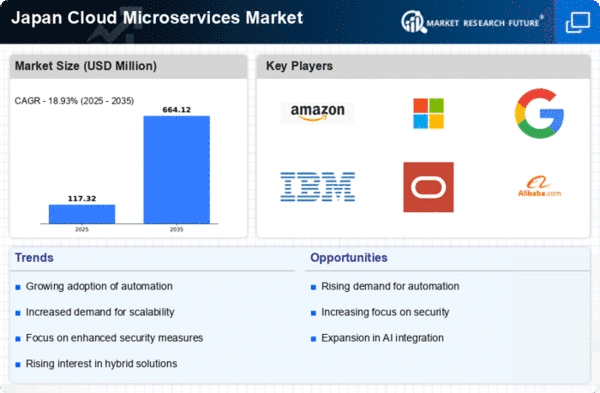Rising Demand for Scalability
The Cloud Microservices Market in Japan experiences a notable surge in demand for scalability solutions. As businesses increasingly seek to enhance their operational efficiency, the ability to scale applications seamlessly becomes paramount. This trend is particularly evident in sectors such as e-commerce and finance, where fluctuating user demands necessitate flexible infrastructure. According to recent data, approximately 70% of Japanese enterprises are prioritizing scalable cloud solutions to accommodate growth. This shift towards microservices architecture allows organizations to deploy updates and new features rapidly, thereby improving customer satisfaction. Consequently, the cloud microservices market is likely to witness substantial growth as companies invest in scalable solutions to remain competitive in a dynamic business environment.
Increased Focus on Cost Efficiency
Cost efficiency remains a critical driver in the Cloud Microservices Market in Japan. Organizations are increasingly adopting microservices to optimize their IT expenditures. By breaking down applications into smaller, manageable services, companies can allocate resources more effectively, reducing operational costs. Recent statistics indicate that businesses utilizing microservices report a reduction in IT costs by up to 30%. This financial incentive encourages more enterprises to transition from traditional monolithic architectures to microservices. Furthermore, the pay-as-you-go model associated with cloud services allows organizations to only pay for the resources they consume, further enhancing cost efficiency. As a result, the cloud microservices market is poised for growth as more companies recognize the financial benefits of this architectural approach.
Enhanced Collaboration and Innovation
The Cloud Microservices Market in Japan is significantly influenced by the need for enhanced collaboration and innovation. As organizations adopt microservices, they enable cross-functional teams to work more effectively, fostering a culture of innovation. This collaborative environment is essential for developing new products and services that meet market demands. Data suggests that companies utilizing microservices experience a 40% increase in the speed of innovation. This acceleration is attributed to the modular nature of microservices, which allows teams to work on different components simultaneously. As a result, the cloud microservices market is expected to grow as businesses recognize the value of fostering collaboration and innovation through microservices.
Growing Emphasis on Digital Transformation
Digital transformation initiatives are driving the Cloud Microservices Market in Japan. As organizations strive to modernize their operations, the adoption of microservices architecture facilitates the integration of new technologies and processes. This transformation is particularly relevant in industries such as healthcare and retail, where agility and responsiveness are crucial. Approximately 65% of Japanese companies are currently engaged in digital transformation projects, with microservices playing a pivotal role in their strategies. By enabling faster deployment of applications and services, microservices support organizations in meeting evolving customer expectations. Consequently, the cloud microservices market is likely to expand as businesses increasingly leverage microservices to enhance their digital capabilities.
Regulatory Compliance and Data Sovereignty
Regulatory compliance and data sovereignty are becoming increasingly important drivers in the Cloud Microservices Market in Japan. With stringent data protection laws in place, organizations must ensure that their cloud solutions comply with local regulations. This necessity is particularly relevant for industries such as finance and healthcare, where data security is paramount. Approximately 75% of Japanese enterprises are prioritizing compliance in their cloud strategies, leading to a greater demand for microservices that can be tailored to meet specific regulatory requirements. As businesses seek to navigate the complexities of compliance, the cloud microservices market is likely to expand, offering solutions that address these critical concerns.
















